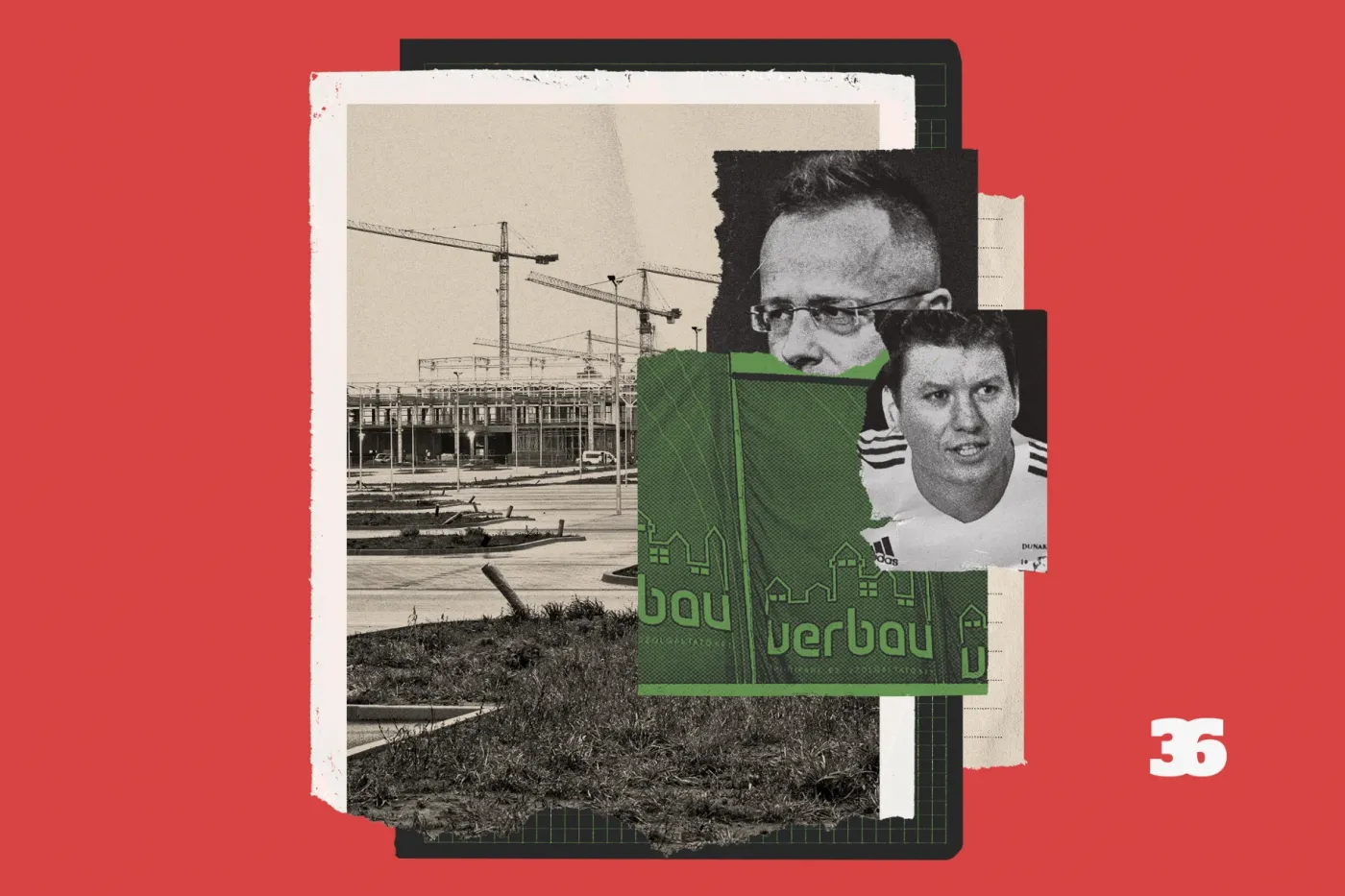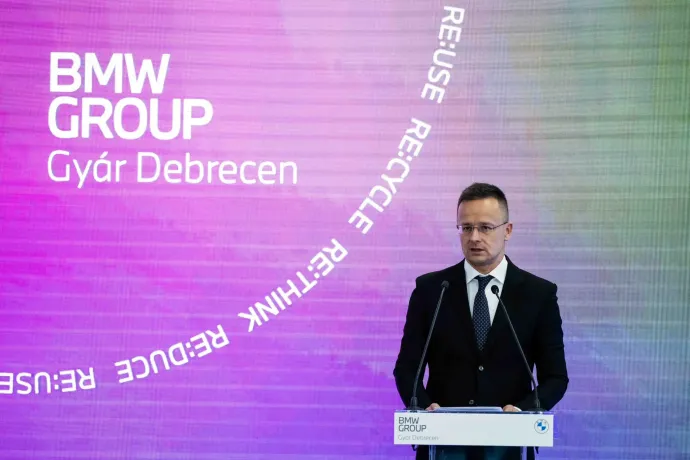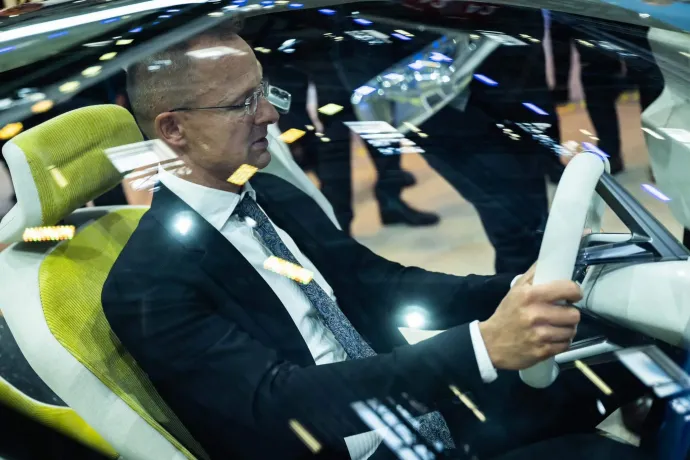Minister Péter Szijjártó was at the forefront of the construction of a BMW factory. His old friend’s company also benefited from the work

In July 2018, Minister of Foreign Affairs and Trade Péter Szijjártó announced that BMW, one of the world’s largest automotive companies, will build its new factory near Debrecen. As time went by, it became even clearer that the investment was particularly important for both the minister and the Orbán government.
In the following years, the government made significant commitments to make it worthwhile for the German giant company to come to Hungary. The Hungarian budget will provide HUF 12.3 billion (EUR 31 million) for the construction of the car plant and a further HUF 14 billion (EUR 35 million) in non-repayable subsidies for the construction of the battery factory that will serve BMW. In addition to the direct subsidies, the government will spend HUF hundreds of billions on infrastructure improvements in the area around the project, which will primarily benefit BMW.
Some of the best-known businessmen close to the government, such as Lőrinc Mészáros, István Garancsi and László Szijj, have also profited from these projects.
There is also a lesser-known participant in this work, but one with close ties to Péter Szijjártó. The construction of the BMW plant and a related railway development project involves a company called Verbau Kft., owned by Szilárd Benkő, a close friend, former colleague and futsal team-mate of the Foreign Minister.
Until 2015, Benkő was one of Péter Szijjártó’s closest colleagues. At that time he left the state administration for the business world, but as Direkt36 has revealed in several articles, his relationship with the minister and with the Ministry was not severed.
During the 2018 election campaign, Benkő, together with several people linked to the Ministry of Foreign Affairs and Trade, tried to help the Fidesz campaign by acting as a member of a poster-damaging team. Two years later, in 2020, one of his companies received nearly HUF 300 million (EUR 760.000) in non-refundable state subsidies from a back office of the Ministry of Foreign Affairs and Trade. The photo of Szilárd Benkő traveling with the foreign minister, who was on holiday on board the luxury yacht Lady MRD was also taken in 2020.
Direkt36 also revealed that Szilárd Benkő, who used to work as an instrument maker, bought Verbau Kft in 2022 after the company won a contract to build a factory in Kecskemét with a HUF 1 billion (EUR 2.5 million) state subsidy. Earlier, we asked Benkő how much exactly he bought Verbau for and from what source he financed the purchase, but we did not get an answer.
We also asked Szilárd Benkő about the works related to the BMW factory, and sent questions to the Ministry of Foreign Affairs and Trade and BMW. Only BMW responded, but even they could not provide information about “existing, suspected, potential and non-partnering” suppliers and their subcontractors.
The backbone of the Hungarian economy
In July 2018, Minister of Foreign Affairs and Trade Péter Szijjártó held a press conference at the Ministry with Róbert Ésik, the then head of the Hungarian Investment Promotion Agency (HIPA) and László Papp, Mayor of Debrecen. Here he announced that German car giant BMW will build its new car plant in Hungary, near Debrecen. The minister said that the decision had been preceded by 14 months of negotiations and that he had personally held several meetings with members of the car manufacturer’s board.

Peter Szijjarto made plenty of announcements about the BMW factory – photo: Facebook page of the minister.
A few months later, at the University of Debrecen, Szijjártó revealed further details. He said that the government had made commitments to bring the negotiations with BMW to a successful conclusion. One of these commitments was that the government would provide HUF 12.3 billion (EUR 31 million) funding for the investment.
In 2023, it was also revealed that the project will be much bigger than previously planned, as the Chinese company EVE Power will also build a factory in the area near Debrecen with the cooperation of BMW. This is where the batteries for BMW’s electric cars will be made. The Hungarian government has also provided HUF 14 billion (EUR 35 million) in non-refundable subsidies for the construction of the battery factory.
One of the important tasks of the Ministry of Foreign Affairs and Trade is to encourage foreign companies to invest in Hungary, and in the case of the BMW plant, the government’s face of the project has been the Minister himself, Péter Szijjártó. He kept the public informed of any new developments in the project. In his speeches, he referred to the automotive industry as the backbone of the Hungarian economy and to the construction of the BMW plant as a guarantee of long-term economic growth.
In recent years, Szijjártó has logged on to social media from BMW’s headquarters in Munich, Bavaria, he was present at the groundbreaking ceremony of the Debrecen plant and regularly explained the benefits the investment will bring to Hungary. He has also been known to get carried away, on one occasion calling a vice president of the European Parliament a hater of Hungarians for arguing that the factory should be built elsewhere.
In addition to the very substantial subsidy of more than HUF 26 billion (EUR 66 million), the government has also decided on infrastructure development worth several billion forints in recent years. While the local people benefit from these developments, the BMW factory will be the primary beneficiary. These include improvements to the area’s road, rail and water networks. Together, these will bring the total investment to the order of HUF hundreds of billions. In 2019 G7 reported that the development of the economic zone linked to the factory will cost the Hungarian state around HUF 130 billion (EUR 328 million).
Businesses close to the government
Several large government-affiliated companies have been awarded HUF billions in public contracts for the gigantic project. István Garancsi’s company Market Zrt. received 22 billion HUF (EUR 55 million) for landscaping and drainage works in the project area. The company called Duna Aszfalt Zrt. owned by László Szijj, who owns the yacht where the Foreign Minister was on vacation, received a road construction contract worth HUF 8.6 billion (EUR 22 million).

Szijjártó led the negotiations – photo: Facebook page of the minister
Among the infrastructure developments, several railway construction projects have been given to Lőrinc Mészáros’s company V-Híd Zrt. For example, the company owned by the former mayor of Felcsút is carrying out the modernization of the Debrecen-Füzesabony railway line number 108, which runs near the BMW factory, as part of a HUF 65 billion (EUR 164 million) contract. This is one of the most expensive parts of the whole project.
Verbau Ltd. also has a role in this railway development project. In a social media post in January 2023, the company announced that it had taken part in the development of the railway line between Debrecen and Füzesabony with a 95,000 square metre concrete paving project.
The details of this task are not available from public procurement databases, as Verbau is likely to have been a minor subcontractor. It is therefore not possible to know exactly how much the company received for the work. A source in the construction industry, who asked not to be named and who was familiar with market prices, told us that the type of concrete Verbau was laying in this project costs between 15 and 16 thousand forints per square metre. On this basis, such a job would cost between HUF 1.4 billion and HUF 1.5 billion (EUR 3.5-3.8 million) at market prices, including material and labour costs.
The Kecskemét-based company said in a post about the work that they had made their mark in Hajdú-Bihar County. This certainly worked out well, because a few months later, in November 2023, Verbau Kft. announced that they were working on BMW’s gigantic factory in Debrecen. According to the post, which is illustrated with photos, the company is building 5 football pitches-sized, 36,000 square metres of industrial flooring for the factory being built on behalf of BMW. According to the source asked by Direkt36, the cost of laying the industrial flooring is around 20-22 thousand forints per square metre. The market price for this work is therefore somewhere between HUF 700 and 800 million (EUR 1.7-2 million)
We asked Verbau how much they received for these contracts. We did not receive a reply to our questions.
Only the Foreign Office
Verbau Ltd. is a Kecskemét-based company founded in 1995, which has been a well-known player in the construction industry for decades. The company has changed owners several times following the corona-virus pandemic, and was bought in 2022 by Péter Szijjártó’s old acquaintance Szilárd Benkő.
As Direkt36 previously revealed, Szilárd Benkő bought the company in 2022 after Verbau won a state-supported project to build a factory. That project was the construction of the Hilti factory in Kecskemét, which was provided by the state with HUF 1.1 billion (EUR 2.7 million) funding. The funding was channeled through the Hungarian Investment Promotion Agency (HIPA), a back office of the Ministry of Foreign Affairs and Trade.
Another company of Benkő, Eutek Ltd., received a non-refundable grant of nearly HUF 300 million (EUR 760.000) in 2020, also through HIPA, part of the Ministry of Foreign Affairs and Trade. In exchange for the grant, the company had to commit to retaining four jobs and investing HUF 560 million (EUR 1.4 million). In the same year, Szilárd Benkő was photographed cruising the Adriatic with the Foreign Minister on the luxury yacht Lady MRD.
Verbau’s annual turnover was already stable at around HUF 5 billion (HUF 12.6 million) before Benkő’s arrival. This figure has risen sharply in recent years, reaching HUF 13 billion (EUR 32.8 million) in 2022 and HUF 22 billion (EUR 55.6 million) in 2023. We asked Verbau how much of this revenue came from public contracts or projects that received public support. The company did not answer these questions either.


